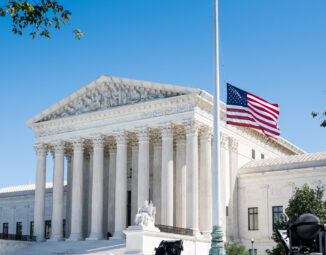Supreme Court Rules Against Public Sector Unions, Disallows “Fair Share” Fees for Public Employees
Today the Supreme Court ruled, in a 5-4 decision, that public sector employees who are not members of a union cannot be forced to pay union fees covering the costs of collective bargaining (Janus v. AFSCME). In doing so, the Court overruled a 1977 case that allowed these so-called “agency fees,” and held that these fees violated the free speech rights of non-union employees. This ruling will have a significant impact on the finances of unions that represent public sector employees across the country.
Prior to today’s ruling, the Supreme Court’s 1977 decision in Abood v. Detroit Board of Education prohibited government employers from charging non-union members for a union’s political or ideological activities, but allowed government employers to charge nonmembers for activities related to the union’s collective bargaining activities on behalf of all employees in a bargaining unit (sometimes referred to as “fair share fees”). For over 40 years, Abood has allowed government employers to require non-union employees to pay union fees that are considered “chargeable” to bargaining activities. The majority in Janus overruled Abood and stated that it was wrongly decided, failed to properly consider the First Amendment implications of mandatory agency fees, and created an unworkable distinction between “chargeable” and “nonchargeable” union expenditures.
The Court described the fees that public sector unions have received from non-members over the past four decades as “unconstitutional exactions” that cannot be allowed to continue. Because nonmembers are waiving their First Amendment rights by allowing these payments, employee consent to these payments must now be freely given and shown by “clear and compelling” evidence. This is similar to many “right-to-work” laws that have already been passed in 28 states prohibiting agency fees for non-union members. In short, Janus makes “right-to-work” the law of the land for public-sector employees.
As a result of the Janus decision, payments to a union cannot be deducted from the wages of public employees unless they have decided to join the union, or they affirmatively consent to the deduction. Public employers are advised to cease deducting fair share fees from employees’ paychecks, and to also withhold remitting payments to the union if deductions have been made and not remitted to the union. Public employers should notify all fair share employees and unions of this decision. Furthermore, as a reminder, employees who currently pay full membership dues to a union cannot automatically leave the union based on this decision, as there may be maintenance of membership clauses in the collective bargaining agreement which would limit the ability of the employee to leave the union prior to the 15 day window prior to the expiration of the collective bargaining agreement. Lastly, public employers should make sure to remove fair share fee language from their collective bargaining agreements in current or future negotiations.
This decision could significantly impact the finances of unions that represent public sector employees, including many large unions that represent both public and private employees across the United States. In the decades since Abood, unions have become increasingly reliant on public-sector representation, while private-sector union membership has dwindled. As of 2017, the union membership rate of public-sector workers (34%) is over five times higher than the private-sector unionization rate (6%). As public employers adjust their pay practices to comply with today’s decision, public sector union revenues will be significantly reduced. Going forward, public employee unions may become more reliant on recruiting bargaining unit members to affirmatively become dues-paying union members. At the same time, public employee unions will still be legally required to represent all public employees falling within their bargaining unit, whether or not they choose to become union members or not.
Employers with questions about the impact of today’s decision should consult labor law counsel with experience with collective bargaining and labor relations. Obermayer attorneys frequently counsel employers regarding labor law and bargaining issues that arise in union and non-union environments in both the public and private sectors.
The information contained in this publication should not be construed as legal advice, is not a substitute for legal counsel, and should not be relied on as such. For legal advice or answers to specific questions, please contact one of our attorneys.






